London Java Community Open Conference
Saturday was, hopefully, my last conference of the year. My lucky readers should start to see some posts which are not simply me gushing about another opportunity to hang out with awesome people and learn about interesting “stuff”.
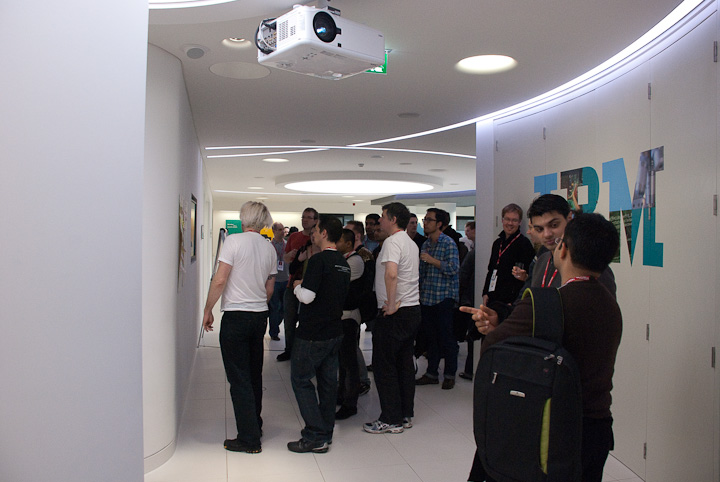 Who wants to propose a session?
Who wants to propose a session?
In many ways the London Java Community Open Conference was my favourite one so far, and not just because it’s near home and I helped to organise it. One of the awesome things about both Java One and Devoxx was the opportunity to travel, to see new places and to meet people you might not meet in London. The scale, and the opportunities to meet key players in the Java world, were the things I probably appreciated the most from both of those conferences. And you can tell from my posts I really enjoyed them.
But the LJC conference was probably perfect as my last one for 2011:
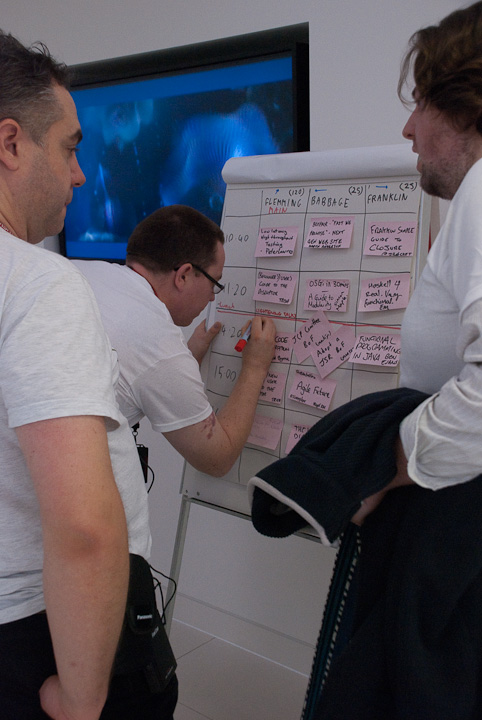 “How do you spell ‘lightning’"
“How do you spell ‘lightning’"
- Being on home turf with awesome people who have really helped drag me kicking and screaming into the conference scene really brought home to me what an amazing year this has been. This time last year, I felt I barely had the credentials to be a behind-the-scenes organiser for the LJC, and I didn’t attend last year’s conference because I wasn’t sure how much I would get out of it. This year, I’m at the conference giving two sessions, having made my international début already.
- With 120 people you feel like you can talk to everyone at some point if you want to. I don’t think I managed that, but I probably chatted in one way or another with maybe half the attendees. The great thing about this is you see the wide variety of things people are working on - the technologies, the business problems, the team and company sizes, the methodologies. It’s eye-opening and quite exciting.
- It seemed that a small, open conference like this drives content based on relevance. We had no vendor pitches, although John was contractually obliged to mention Atlassian at least once every half hour (but as they paid for the beer, this was only fair). People vote with their feet, and attend the sessions that they will get the most out of. I liked this format a lot.
- I presented alone for the first time, not hiding behind Mike or Martin. I found this surprisingly liberating. I love working with those guys, but without them providing a safety net I actually found my confidence increasing as I realised I was perfectly capable of answering things I would probably have let them field.
- My second session was more workshop-like, and I wanted the audience to guide what we covered. I thought it went really well, I loved letting the audience guide it, and I enjoyed giving it.
- I was honoured (and terrified) to be asked to be part of a Meet the Experts panel with people who actually know what they’re talking about. I was very very pleased to get away with not being asked any questions about being a girl or the length of my skirt. We had a great discussion around writing high performance code, about different technologies and their applicability, and about the future of Java and JVM-based languages.
- I loved the venue. The rooms were a nice range of sizes, all with projectors of course, but also whiteboard space and flip charts. It looked like a 1960s version of the future - all shiny white surfaces and curving lines. But it felt like a space to create and innovate in.
- Mike’s Hacking the Open JDK session in the morning was excellent. Again, this was another example of a workshop format working really well. He gave some good background to compilers in general, and a good walk through of some of the code that’s there at the moment. He was happy to share stuff he’d learnt the hard way, and it made me want to get more involved in that side of things.
- The food was awesome.
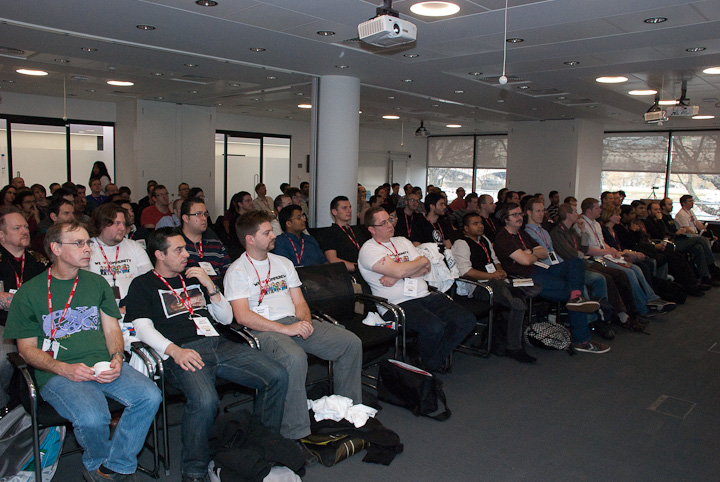 Clearly people haven’t had enough coffee yet.
Clearly people haven’t had enough coffee yet.
My sessions were User’s Guides to the Disruptor - a beginner’s and a more advanced one. The beginner’s was an updated summary of the Disruptor stuff already covered in this blog - the ring buffer, writing to and reading from it, and configuration. The second session covered more advanced ideas: you don’t need a ring buffer any more; cache lines and false sharing; worker pools; aggregate event handlers. This session was a lot less prepared and more collaborative, and I loved giving it. Maybe that’s my teacher-genetics coming out.
The aim of both sessions was to give people an idea of how to actually use the Disruptor - developers are definitely interested in how and why it works, but we’ve been evangelising a lot and now there are very sensible questions being asked about how to get it to do various things. I’d like to run some more of these sessions in future, and to add more material to the blog.
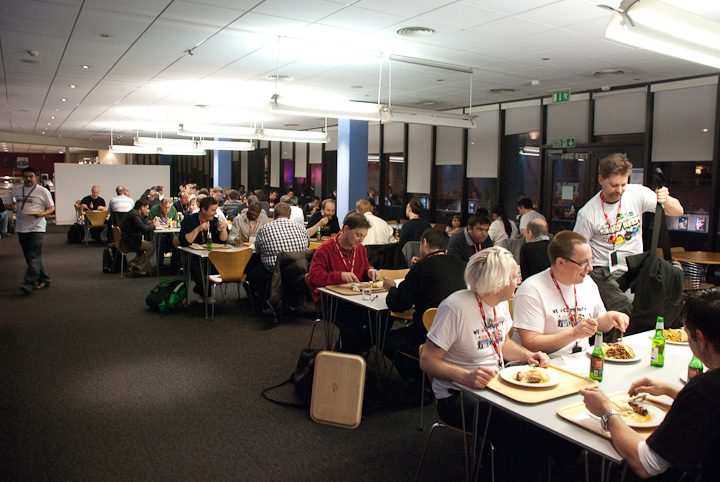 And finally, a proper meal before more beer.
And finally, a proper meal before more beer.
Back to the conference. Were there any downsides? Personally I had none. If I had to suggest an improvement for next year, it’s that we would like to see more novice speakers presenting. The LJC has always been about nurturing this talent, and a small conference like this one with a friendly audience, many of whom you may already know, is a great place to practice. The lightning talks showed the great variety (and abilities) of our members, it would be nice to expand this to full sessions. As I found, filling a 30 minute session is not anywhere near as hard as you think!
I’m really looking forward to next year’s LJC conference, and I’m totally buzzing from the positive vibe from this year’s.
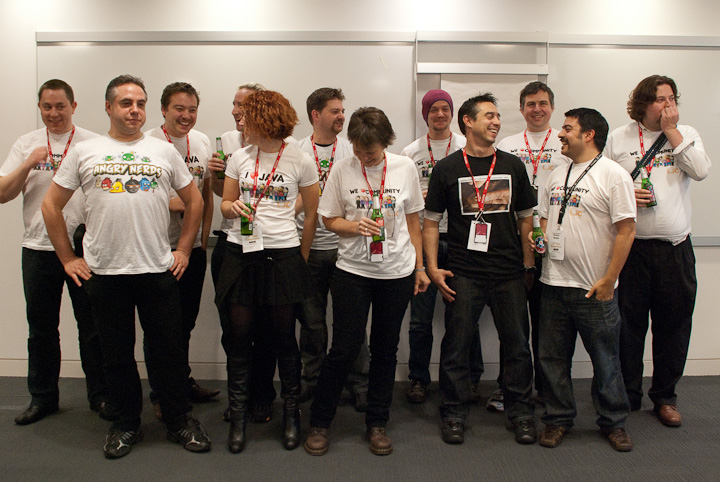 The LJC Associates modelling their lovely new t-shirts. Mine fits!
The LJC Associates modelling their lovely new t-shirts. Mine fits!